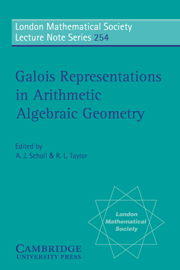Book contents
- Frontmatter
- Contents
- Preface
- List of participants
- Lecture programme
- 1 The Eigencurve
- 2 Geometric trends in Galois module theory
- 3 Mixed elliptic motives
- 4 On the Satake isomorphism
- 5 Open problems regarding rational points on curves and varieties
- 6 Models of Shimura varieties in mixed characteristics
- 7 Euler systems and modular elliptic curves
- 8 Basic notions of rigid analytic geometry
- 9 An introduction to Kato's Euler systems
- 10 La distribution d'Euler-Poincaré d'un groupe profini
5 - Open problems regarding rational points on curves and varieties
Published online by Cambridge University Press: 23 March 2010
- Frontmatter
- Contents
- Preface
- List of participants
- Lecture programme
- 1 The Eigencurve
- 2 Geometric trends in Galois module theory
- 3 Mixed elliptic motives
- 4 On the Satake isomorphism
- 5 Open problems regarding rational points on curves and varieties
- 6 Models of Shimura varieties in mixed characteristics
- 7 Euler systems and modular elliptic curves
- 8 Basic notions of rigid analytic geometry
- 9 An introduction to Kato's Euler systems
- 10 La distribution d'Euler-Poincaré d'un groupe profini
Summary
PART I. Questions of Uniformity
The organizers of the Durham conference on Arithmetic Algebraic Geometry, in July 1996 asked me to give a general lecture in the conference on my work with Lucia Caporaso and Joe Harris [C-H-M 1, 2]. I was more than happy to oblige: there had been some recent progress in the subject, thanks to Hassett, Pacelli, and Abramovich, and I was thankful for an opportunity to report on this work. I also used the opportunity to discuss some specific “applications” of these ideas to the study of rational isogenies and to list some related open problems. Part I of this article is the written version of that lecture. I am grateful to J.-P. Serre to include in this text some portions of a letter he wrote to me (cf. the Appendix to part I), and to Brian Conrad and Richard Taylor for conversations leading to the material in section 8 below.
One of the goals of [C-H-M 1, 2] was to set up something which might be called a “machine” which shows that a conjecture due to Lang [L], which on first view seems purely “qualitative” implies conjectures which assert that here are uniform upper bounds for numbers of rational points.
Our first chore, then, is to describe Lang's conjecture.
Rational points on varieties of general type
Our base field K will always be a number field; i.e., a field of finite degree over Q. Let V be a reduced, irreducible, positive-dimensional variety over K.
Information
- Type
- Chapter
- Information
- Galois Representations in Arithmetic Algebraic Geometry , pp. 239 - 266Publisher: Cambridge University PressPrint publication year: 1998
Accessibility standard: Unknown
Why this information is here
This section outlines the accessibility features of this content - including support for screen readers, full keyboard navigation and high-contrast display options. This may not be relevant for you.Accessibility Information
- 8
- Cited by
